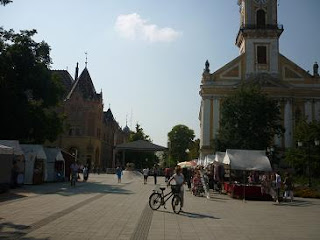by Junta
Round 7
In the battle between two of the leaders, Azerbaijan crushed Bulgaria 3½-½, and with the other leader Romania beaten by Germany 2½-1½, the leaderboard showed:
12MP - Azerbaijan
11MP - Armenia, Germany
10MP - Hungary, Bulgaria, Netherlands, Romania
Topalov (2768, Bulgaria) -
Radjabov (2781, Azerbaijan), Round 7.1.1, 09.11.11
 |
| After 43.Qc2 ½-½ - the finale of a King's Indian symphony with each side dominating their own colour |
On Boards 2 and 3, Gashimov and Mamedyarov scored nice wins - you can see those games
here and
here.
Morozevich (2762, Russia) -
Illescas (2609, Spain), Round 7.6.4, 09.11.11
A position with appealing geometry all over.
Morozevich won in style with
30.Rxe2 Rxe2 31.Qxe2! Qxe2 32.bxc7 1-0
Round 8
Sensation as the German team defeat the Azeris 2½-1½ to overtake them in the lead (Naiditsch scoring the crucial win against Radjabov on top board), with Armenia also keeping pace by defeating the Dutch 3-1. The Romanian team surprised yet again by holding Hungary to a draw, and Bulgaria were back to their winning ways, beating Italy 3-1.
Radjabov as White began with
1.Nf3 d5 2.c4 d4 3.b4, a line I am fond of playing also, although objectively, with Black playing the best lines I don't think White can hope for much of an advantage. I held a faint hope that he had found some new lines to disprove this, but it wasn't to be as Naiditsch comfortably gained the upper hand.
With only the final round to go, the standings (with the first tiebreak factor, game points in brackets) were:
13MP - Armenia (21), Germany (20), paired in Round 9
12MP - Azerbaijan (20), Bulgaria (18½)
11MP - Hungary (19), Romania (19), Russia (18½)
Round 9
Table 4 - Russia beat Slovenia 3-1, but the losses in Rounds 4 and 6 were too costly, so they did not have enough to reach the podium. As Ian Rogers commented on today's
The Canberra Times chess column, a team of champions isn't necessarily a champion team - after the failures at gold over the years, it must be difficult to change the flow of things, but they will have to try and meet the expectations as the top seeded team again at next year's Olympiad in Turkey.
Table 3 - A demolition of Bulgaria by Hungary - 4-0!? Leko's win over Topalov was
quite exciting, and his teammates also played strongly to win - but such a scoreline between two battle-hardened teams is difficult to explain with just the play. While Hungary had been bubbling a couple of MP's below the leaders for several rounds, eyeing chances of bronze, the Bulgarians had been leading the event at one stage, and perhaps they found it hard to play with both intensity and objectivity when their chances of gold were now very, very slim.
Table 2 - Gashimov and Mamedyarov won again, and the Azeris were victorious against the Romanians 3-1. So, at this point, the Azeris were on 14MP (23GP), and following on 13MP were Hungary (23) and Russia (21½).
As the leaders on 13MP had 21 and 20 GP, Azerbaijan could potentially take gold!
And thanks to their 4-0 win, the Hungarians now were real candidates for bronze.
Armenia beating Germany would lead to...Gold - ARM, Silver - AZE, Bronze - HUN
A 2-2 draw would lead to...Gold - AZE, Silver - ARM, Bronze - GER
Germany beating Armenia would lead to...Gold - GER, Silver - AZE, Bronze - HUN
Table 1 - Naiditsch and Aronian had a quick draw on Board 1, and Fridman-Akopian on Board 3 was also drawn. Germany's 2nd board Meier played a
brilliant French game beating Movsesian, so everyone's eyes were on the Board 4 game which lasted over 5 hours - could German Board 4 Gustafsson hold on for a draw to give the team gold, or would Sargissian win to tie the match 2-2, giving Azerbaijan gold?



























